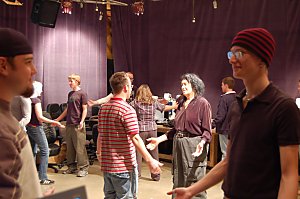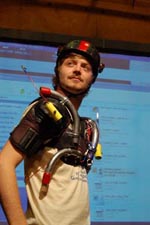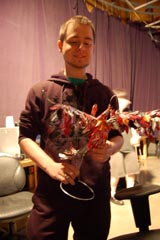ACTLab Courses
There are thirteen ACTLab New Media courses, two of which are taught each semester. Each one is a combination of theory and making, with emphasis on making. Ideally, six of the twelve courses make up a rich New Media sequence in which we cover almost everything we think you need to know in order to be a transdisciplinary practitioner in New Media production and studies. You'll find suggestions for a complete New Media course of study below. Although topic names are fixed, actual course content changes each semester, so courses may be repeated for credit.
All ACTLab courses, here and at ACTLab sister programs worldwide, are based on the ACTLab transdisciplinary framework. There is a short description of the framework at the bottom of the page, a more detailed discussion on the pedagogy page, and in popularized form in the essay Under the Radar.
Trans: Exploring dangerous border violations. Transformation and change are key as are boundary theory, transgender, gender and sexuality and their relation to subjectivity, flow, and identity.
Weird Science: The examination of social and anthropological concepts of innovation, the boundaries between "legitimate" science and fakery, monsters and the monstrous, physics, religion, legitimation, charlatanism, and informatics of domination.
Blackbox: The study of how information becomes established as factual and how things are assigned meaning. Closure, multiplicity, theories of discourse formation, studies and practices of innovation, and language are also explored.
PostModern Gothic: We discuss monsters, desire, and epistemic rupture as well as theories and histories of the gothic, We move into the realm of the modern goth, vampires, monsters and the monstrous, genetic engineering, gender and sexuality, delirium, postmodernity, and cyborgs.
Death: Challenges cultural attitudes toward death, cultural definitions of death, political battles over death, cultural concepts of the afterworld, social and critical studies of mediumship, "ghosts", spirits, and zombies in film and folklore; We explore the spectrum of death, which may range from the not very dead, to near death, the brain dead, complete death, and of course, the undead.
Performance (Taking It to the Street): Practicum in culture hacking with a documentary component. New Media's impact on performance and the performative, performance as political intervention, history and theory of theatre, masks, puppetry, spectacle, ritual, street theatre, all from the perspective of New Media.
When Cultures Collide: Building multinational virtual communities for purposes of social transformation. Language and episteme, cultural difference, subaltern discourses, orientalism, mestiza consciousness.
Soundscapes: Theory and practice of New Media sound, sound art, multitrack recording, circuit bending, sound in virtual worlds, and "music" (in the sense described by John Cage).
Disruptive Technologies (New for Spring 2008): What constitutes disruptive technology, history of disruptive technologies, techniques of intervention, oppositional and emergent discourses, media and subversion, political power and postmodernity, hypothetical future medias.
The Uncanny (New for Fall 2008): Things, situations, sounds, and discourses that give you the creeps. Beginning with Freud's theory of the "Unheimlich", the Uncanny Valley effect in extreme digital animation, Nineteenth Century fascination with spirit communication, and technology in science fiction/fictions of science, we'll study and practice making things that evoke that sense of something hovering just beyond comprehension.
Dream/Delirium: An exploration of the space between waking and dream states. Consciousness continuums and the creative discoveries that emerge from this space. Where do dreams end and realities begin?
Extreme Freestyle Hacking: Investigation of hacking as the political art of "detournement" in all facets of society. The way we modify things to make them do things they aren't supposed to do.
The ACTLab framework includes cognitive neuroscience ("producing cognitive shift") and the critical importance of context (Whittaker and Burberry); reclaiming visual image making as a natural form of expression (London); translating images from the imagination into daily life (Allen); action methods, engaging in purposeful physical activity as a component of reasoning (Wiener); play as activity structured at the metalevel (Levine); and foundational work in intermodal expressive arts by Knill, Levine, and Eberhart, et. al. Classes combine elements of social science, critical and cultural theory, theatre arts, film and video production, boundary transgression, epistemic rupture, and play.





